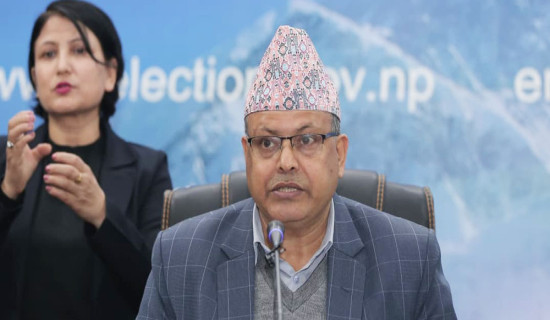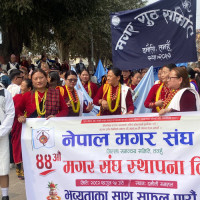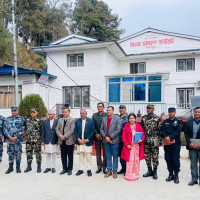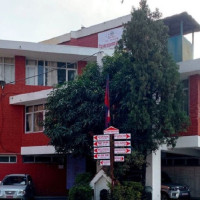- Saturday, 28 February 2026
Focus On Early Childhood Development
Early childhood is an important phase of human life. Nurturing this phase with appropriate education is a stepping stone to preparing children for further phases in life, such as adulthood. This is because developments that occur during this phase may influence other phases in life. Nepal has prioritised Early Childhood Education (ECE), an important part of education, for quite a long time. ECE began in the country in 1950 with the establishment of the first-ever Montessori school in Kathmandu. In 1964, the Nepal Children’s Organisation (NCO) was established to provide ECE for all children in all the districts.
During the 1980s, two programmes were embarked upon to support ECE in the rural areas with support from the Agriculture Development Bank (ADB): the Small Farmers Development Programme and the Ministry of Local Development Credit for Rural Women Programme. From the late 1980s to the early 1990s, international organisations such as UNESCO and UNICEF helped establish ECE centres in collaboration with the government and local non-governmental organisations (NGOs). In 1997, the Department of Education initiated the Shishu Kaksha Programme under the Basic Primary Education Programme to establish ECE centres.
Momentum
The momentum of the establishment of ECE centres has since picked up. The necessity of ECE centres has now been amplified in consideration of the Sustainable Development Goals (SDGs), which will have to be fulfilled by 2030. There are three types of ECE centres in Nepal: school-based pre-primary classes, community-based early childhood development (ECD) centres and private kindergartens. School-based pre-primary classes are found in the mountains, hills, valleys and Terai regions. These ECE centres are government-funded. Even textbooks are provided by the government free of cost. The medium of teaching is Nepali.
However, teaching in mother tongues is not disallowed. Kindergarten facilitators are appointed by the government. Even so, such centres have not run satisfactorily. They have to run amid myriad problems such as a lack of infrastructure and facilities, a high child-teacher ratio, a lack of proper classroom arrangement and a lack of healthcare facilities. Community-based ECD centres are operated by international NGOs and local NGOs in collaboration with the government and local communities. Kindergarten facilitators are locally appointed.
However, they have to meet the criteria set by the government. Salaries are paid to teachers partly by the government and partly by INGOs or NGOs, with contributions made by parents. Private kindergartens are mainly concentrated in urban areas and district headquarters. The medium of teaching is English. Such kindergartens have well-developed infrastructure, ample educational facilities and well-organised classrooms. However, not all parents can afford to send their wards to such educational centres. Only well-to-do parents can afford high fees.
ECE has not developed to a satisfactory extent in Nepal. There are many factors contributing to such a sorry state of the ECE sector. Owing to topographical and other factors, certain parts of the country are still devoid of ECE centres. Poverty, illiteracy and atavistic beliefs are also considered barriers to accessing ECE. Poor families are unable to send their children to ECE centres because they are not in a position to afford the fees. Moreover, some poor parents make their children work to supplement their income rather than send them to school. There is still gender discrimination in the rural areas. As such, while male children are sent to school, female children are made to do household chores. The superstition that daughters should not be educated is still prevalent in some rural families.
Caste discrimination is another factor that may prevent Dalit children from attending ECE centres. The number of Dalit children attending ECE centres is far lower than that of non-Dalit children. The Constitution of Nepal treats all the castes as equal, but in practice, there is gaping discrimination in society. It is a pity that Dalits should endure not only discrimination but also torture at the hands of upper-class people. Education is a social good that should be accessible to all, whether Dalits or non-Dalits.
ECE centres are not disability-friendly. This has prevented many disabled children from attending ECE classes. The government should pay heed to this factor too and take the initiative in building disabled-friendly structures in ECE centres. No children should be deprived of education just because they are disabled. There is a huge gap in the quality of education imparted in government-supported and private ECE centres. In community ECE centres, the child-teacher ratio is far higher than that in private ones. Community ECE centres also lag far behind their private counterparts in terms of infrastructure and facilities.
Teaching technology
Likewise, teachers in community ECE centres are not adequately competent and qualified vis-à-vis their counterparts in private ones. And the teaching methods are also different. In private ECE centres, sophisticated teaching methods are used, whereas traditional methods are used in community ones. So it behoves the government to invest in the infrastructure, facilities and teaching technology of community ECE centres. The concept of ECE professionalism is rudimentary in Nepal. Such a concept is highly developed in American and European settings. Teaching children is not an easy task. Their minds are blank and need to be moulded positively.
Here, the professional qualifications and teaching methods of teachers count a lot. Only professionally competent and experienced teachers can impart proper education to children. ECE teachers should, therefore, be properly trained in the relevant activities. At the same time, infrastructure and facilities should also be built, and extra-curricular activities should be prioritised. Teaching children with a focus on extra-curricular activities such as playing, singing, dancing and entertainment will be more fruitful than one based on textbooks. After all, ECE is the foundation of education, which needs to be promoted through the collaboration of the government, the general people and other stakeholders.
(Maharjan has been regularly writing on contemporary issues for this daily since 2000.)









-original-thumb.jpg)







